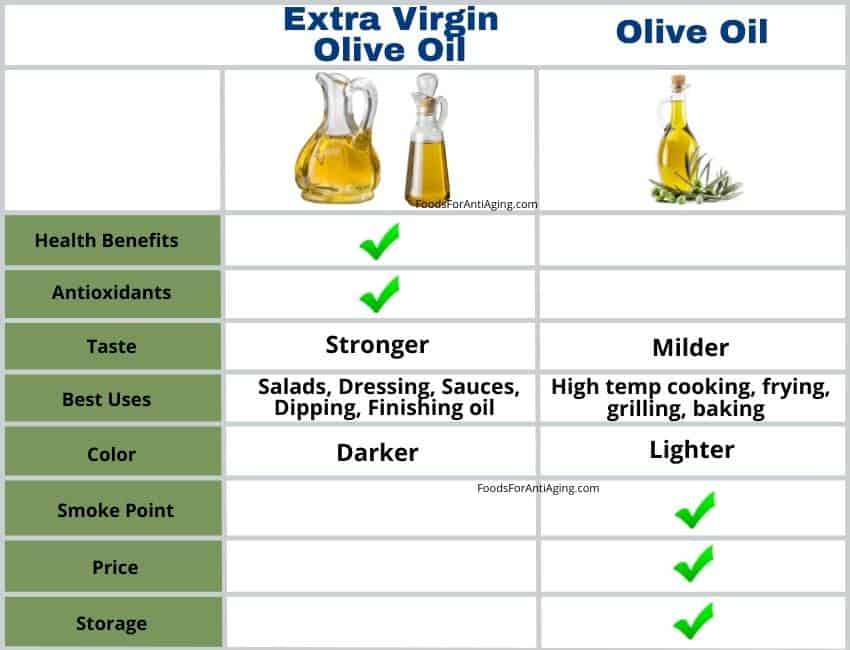Extra Virgin Olive Oil vs Olive Oil: A Complete Comparison
During my health coaching sessions, many clients inquire about the different types of olive oil. They know I use and recommend olive oil all the time. One of the popular questions asked is, which is better, extra virgin olive oil or olive oil?
Extra virgin olive oil is better than olive oil due to its higher percentage of antioxidants and health benefits resulting from no heat or chemicals in its processing. Extra virgin olive oil has a stronger olive taste than the more neutral olive oil. For these reasons more people prefer it in their dishes and recipes.
This article will include a side-by-side nutrient comparison and examine all the differences between the two oils including, tastes, which one is better for different cooking methods and price. In addition, I’ll take a close look at how each one is made and how that affects its health benefits.
Extra Virgin Olive Oil vs Olive Oil: The Differences
Extra virgin olive oil is made by cold-pressing olives and extracting the oil. There is no heat or chemicals used during the process and the finished product has no other ingredients. Olive oil is made by extracting the oil from olives using heat and/or chemicals. The finished olive oil is a blend of refined and extra virgin olive oil.
Extra Virgin (EVOO)
- Made from cold-pressed olives.
- Any olive oil that is certified as “extra-virgin” has not been exposed to a chemical or heat treatment.
- Has a strong, olive like flavor.
- Cost more money.
- Has a slightly lower smoke point.
- Retain more antioxidants and benefits.
- Extra virgin olive oil tends to be darker in color than lower quality oils..
It is made by the following method:
- Olives are crushed into a pulp using only force without the use of heat or chemicals.
- Once the pulp creates a paste, it’s kneaded to release the liquid from the pulp.
- The liquid consists of oil, water and residue.
- The liquid is place into a centrifuge which separates the water and residue.
- It is filtered and bottled.
Regular Olive
- Made from olives using heat and chemicals.
- Has a mild, neutral flavor.
- Cost less money.
- Has a higher smoke point.
- The additional processing results in fewer antioxidants and benefits.
- Typically lighter in color.
It is made by the following method:
- It is made by using the leftover paste from making EVOO.
- The leftover paste is heated and kneaded with chemicals to release more oil, water and residue from the paste.
- It is separated from the water and residue.
- It’s then filtered and bottled.
As far as USDA grade standards, olive oil is certified as having acceptable flavor, odor and free fatty acid content. It must not exceed 1.0 grams of oleic acid per 100 grams.
The doctor in the following video explains the differences between extra virgin and regular oils.
Extra Virgin Olive Oil vs Olive Oil: Nutrient Comparison
The following table compares the nutrients contained in one tablespoon of each one:
| Olive Oil (1 Tbsp/13.5 grams) | Extra Virgin Olive Oil (1 Tbsp/13.5 grams) | |
| Calories | 119 | 108 |
| Protein | 0 g | 0 g |
| Carbohydrates | 0 g | 0 g |
| Fiber | 0 g | 0 g |
| Fat | 13.5 g | 12.6 g |
| Sugar | 0 g | 0 g |
| Sodium | 0.27 mg | unk |
| Vitamin K | 8.13 mcg | 8.13 mg |
| Vitamin E | 1.94 mg | 1.94 mg |
| Potassium | 0.135 mg | 0.135 mg |
| Iron | 0.076 mg | 0.076 mg |
| Calcium | 0.135 mg | 0.136 mg |
| Omega-3 | 103 mg | 103 g |
| Omega-6 | 1,318 mg | 1,318 g |
The nutrients slightly differ from one manufacturer to the other. This can be due to the olive variety used, time of year they were pressed and other factors.
Since most of the nutrients appear to be similar, a question asked is which is healthier?
Extra virgin olive oil is healthier than olive oil due to its higher percentage of antioxidants. Scientific research has shown extra virgin olive oil contains more polyphenols than regular. The heating and chemical process of olive oil reduces some of its antioxidants.
EVOO does not go through the heat and chemical process, therefore it retains more of its antioxidants. For these reasons I always purchase and use it myself. Even if the store is out of it, which is rare, I won’t buy the regular type.
Olive Oil Taste
Sometimes the taste and texture is all that matters to some people when eating a meal. After all, if someone doesn’t like how a food tastes, they will probably leave it on the shelf.
Therefore, let’s examine how the taste of each one compares.
Extra virgin olive oil has a stronger flavor than the milder olive oil. Extra virgin tastes more like an olive and is peppery with a hint of fruity. Olive oil has a hint of the same flavors but much less and more neutral.
I wanted to get the opinion of real people like you by conducting some original research. Therefore, I reached out to some members of food groups, my clients and readers. I asked, which one tastes better?
- 78% said they preferred the taste of extra virgin olive oil.
- 18% said they preferred the taste of olive oil.
- 4% said they had no preference.
I also participated in my own blind taste test. I tasted a small spoon of each one. I picked the extra virgin as the better taste.
In the battle of taste, extra virgin olive oil tastes better and was the winner in the poll and in my own taste test.
Substitutions
Sometimes people will want to substitute one food for the other in a recipe. Reasons for doing this may include smoke point, availability, taste, price or just for variety.
This makes people wonder if they can substitute one for the other.
Extra virgin olive oil and olive oil can substitute for each other in recipes not involving cooking, although the flavor will be less strong when using olive oil. Olive oil can substitute for extra virgin when cooking due to its higher smoke point. Extra virgin can substitute for olive oil when cooking in temperatures less than 375°F.
Olive oil has a higher smoke point than EVOO. At higher temperatures the flavor of extra virgin oil begins deteriorating, and an acrid burned taste develops.
At lower temperature cooking, or cold recipes, EVOO and olive oil are relatively interchangeable.
Substitute using equal amounts, there is no need to use extra of either one.
Olive oil substitutes for high temperature cooking include the following:
- Refined avocado oil
- Safflower oil (refined and neutralized)
- Extra virgin avocado oil
- Pecan oil
EVOO substitutes include the following:
- Extra virgin avocado oil
- Pecan oil
- Virgin olive oil
- Refined avocado oil
- Soybean oil
- Sesame oil
- Peanut oil
The following are the oils with the highest smoke point to the lowest:
| Type of Oil & Fats | Smoke Point (Fahrenheit) |
| Avocado Oil – Refined | 520°F |
| Safflower Oil – Refined | 510°F |
| Sunflower Oil – Neutralized | 489°F |
| Extra-Virgin Avocado Oil | 480°F |
| Pecan Oil | 470°F |
| Olive Oil – Refined | 470°F |
| Corn Oil | 460°F |
| Palm Oil – Fractionated | 455°F |
| Soybean Oil | 453°F |
| Peanut Oil – Refined | 450°F |
| Rice Bran Oil – Refined | 450°F |
| Sesame Oil – Semi refined | 450°F |
| Sunflower Oil – Refined | 450°F |
| Vegetable Oil – Refined | 428°F |
| Olive Oil – Virgin | 410°F |
| Coconut Oil – Refined | 400°F |
| Canola Oil – Refined | 400°F |
| Olive Oil – Extra virgin | 375°F |
| Chicken Fat | 375°F |
| Lard | 374°F |
| Vegetable Shortening | 360°F |
| Corn Oil – Unrefined | 352°F |
| Coconut Oil – Unrefined | 350°F |
| Butter | 302°F |
| Flaxseed Oil – Unrefined | 225°F |
Smoke point source ((Wikipedia: Smoke point))
Find out how grapeseed oil compared in my article and find out if it’s just as good.

The Prices
The supermarket shopping was expensive to begin with, but lately the price at checkout keeps increasing. I’m sure the prices of food matters to most people, so let’s examine the prices of each.
Extra virgin olive oil costs 28% more than olive oil per ounce. Extra virgin olive oil average cost per ounce is $0.23 and the average price for olive oil per ounce is $0.18.
To conduct my own research, I checked two different supermarkets located in my area. Both supermarkets are on different levels of pricing. Walmart market is the most economical and Shoprite being more expensive.
Here are my findings, I first visited Walmart:
Walmart:
- Extra virgin olive oils (Store brand) – 17 ounce $3.94 ($0.23 per ounce)
- Olive oils (Store brand) – 17 ounce $2.52 ($0.15 per ounce)
Shoprite:
- EVOO (Store brand) – 51 oz $11.99 ($0.24 per ounce)
- Olive oils (Store brand) – 51 oz $10.99 ($0.22 per ounce)
Find out how vegetable oil compares in my article and find out if it’s really as bad as they say.

How to Store
Both can be stored the same.
Store olive oil or extra virgin in a cool, dark location away from light. It’s best to store either one in a tinted glass container. They should be kept at a temperature between 55-60℉, although it can be refrigerated or frozen if needed.
Store either one in the refrigerator if the room temperature rises above 70℉. Leaving them in warmer temperatures affects shelf life and lessens the quality.
Which to Choose Based on Your Goals
Many people have particular goals which food plays a huge role in. Which one you choose may depend on your particular goal.
Therefore, in this section I examine the most common goals and determine which one is the better choice.
Weight Loss
If you’re looking to shed some extra pounds from the mid-section, the number of calories will matter to you.
Therefore, let’s examine which is better for weight loss.
- Extra virgin and regular olive oil are similar for weight loss because they contain a similar number of calories per tablespoon.
One problem people run into is adding too much dressing to their salad. The calories can add up pretty fast, so try not to overdo it.
Many people would be surprised to find out how many calories are actually in their salad due to unhealthy ingredients or too much dressing.
Low Carb or Keto Diets
The goal of any low-carb diet is to take in few carbohydrates and more protein and fat. The numbers can be so limited every carbohydrate can make a difference by the end of the day.
Therefore, let’s examine which one has fewer carbohydrates or more fat.
- Extra virgin olive oil and olive oil are both beneficial for low-carb diets due to their similar amount of fat and carbohydrates. Both of them don’t contain any carbohydrates and are a healthy source of fats.
Bodybuilding
If you’re trying to gain lean muscle mass, the amount of protein and carbohydrates make a difference.
Extra virgin olive oil and olive oil are similar for bodybuilding because neither oil contains protein or carbohydrates. Both of them contain healthy fats and are a good addition to any bodybuilding diet.
Gluten Free
For people who wish to follow a gluten free diet or have Celiac disease, the goal is clear cut, avoid gluten. Therefore, let’s take a closer look at which one is gluten free.
- Extra virgin olive oil and olive oil are both gluten free and good for gluten free diets.
Find out how avocado oil compared in my article. Find out if it’s actually better.

Health Benefits of Extra-Virgin Olive and Regular Olive
Extra virgin olive oil provides more benefits due to its higher percentage of antioxidants. Even though, both contain a wealth of healthy fats and antioxidants. The fats and antioxidants provide many health benefits which I’ll examine in this section.
Heart Disease
Heart disease and stroke are among the most common causes of death throughout the world. Studies have shown heart disease is lower in the Mediterranean countries where olive oil is a big part of their diets.
There are many ways it is beneficial for the heart including the following:
Lowering Blood Pressure
Studies have shown an association between lower blood pressure and an increase in olive oil consumption. The Mediterranean diet has been linked to lower blood pressure and cardiovascular disease3.
Blood Vessel Health
It has been shown to help improve the lining of blood vessels. A study published in 2015 showed blood vessels opened up and increased blood flow in people who included it in their diet4.
Reducing Inflammation
It is associated with decreases in inflammation which is a main component of heart disease. An antioxidant in the oil, oleocanthal, is an anti-inflammatory that also reduces pain5.
Reducing Blood Clotting
Unwanted blood clotting could contribute to heart attacks and strokes. A study in 2017 found weekly consumption of extra virgin was beneficial to help prevent unwanted blood clotting6.
LDL (Bad) Cholesterol
Studies have shown the polyphenols to decrease oxidative stress biomarkers and improve LDL cholesterol7
Find out if sesame oil provided the most benefits in my recent article.
Cancer
The cancer rates in Mediterranean countries is lower than other places. As noted earlier, extra virgin olive oils consumption is a huge part of the diet.
Antioxidants are believed to contribute to the killing of cancer cells. In a 2015 study, oleocanthal, a phenolic compound present in olive oil, helped kill cancer cells in less than one hour8.
Another study published in 2015 evaluated the consumption of the Mediterranean diet and the incidence of breast cancer. For a six-year period, 4,282 women aged 60 to 80 years followed three different diets:
- Mediterranean diet supplemented with extra-virgin oil
- Mediterranean diet supplemented with mixed nuts
- A reduced fat diet
After 4.8 years 35 of the women developed breast cancer. The lowest rate of breast cancer was seen in the women who supplemented with the EVOO9.
Brain Health
Alzheimer’s disease is the most common form of dementia causing problems with thinking, memory and behavior. A common feature of the disease is the build-up of proteins known as beta-amyloid plaques in certain neurons in the brain.
Animal studies have shown EVOO to clear the beta-amyloid proteins from the brain helping to prevent Alzheimer’s disease10.
Several studies conducted on humans have shown the Mediterranean diet may be associated with a reduced risk of cognitive problems and dementia11.
Find out how sunflower oil compared in my article.

If you have any questions about this article don’t hesitate to email us. You can find an email on our contact page.
Read More Virgin Olive and Oil Articles!
Olive Oil vs Coconut Oil: Which is Better? Let’s Compare
Olive Oil vs Soybean Oil: Which is Better? Let’s Compare
Olive Oil vs Canola Oil: Which is Better? Let’s Compare
A Guide For Frying With Avocado Oil
The Complete Guide to Storing Extra Virgin Olive Oil
11 Reasons Why You Should Use Avocado Oil for Cooking
Can I Replace Olive Oil With Coconut Oil?
Can Extra Virgin Olive Oil Go Bad? What You Need to Know
This is the Best Way to Store Your Olive Oil
- USDA: Oil, olive, salad or cooking [↩]
- USDA: Oil, olive, extra virgin [↩]
- National Center for Biotechnology Information: Virgin Olive Oil and Hypertension [↩]
- (National Center for Biotechnology Information: Effects of Olive Oil on Markers of Inflammation and Endothelial Function-A Systematic Review and Meta-Analysis [↩]
- National center for Biotechnology Information: Olive Oil-related Anti-inflammatory Effects on Atherosclerosis: Potential Clinical Implications [↩]
- National Center for Biotechnology Information: A review on management of cardiovascular diseases by olive polyphenols [↩]
- National Center for Biotechnology Information: Olive Oil Polyphenols Decrease LDL Concentrations and LDL Atherogenicity in Men in a Randomized Controlled Trial [↩]
- Taylor & Francis Online: (-)-Oleocanthal rapidly and selectively induces cancer cell death via lysosomal membrane permeabilization [↩]
- Jama Internal Medicine: Mediterranean Diet and Invasive Breast Cancer Risk Among Women at High Cardiovascular Risk in the PREDIMED Trial [↩]
- National Center for Biotechnology Information: Extra-Virgin Olive Oil Attenuates Amyloid-β and Tau Pathologies in the Brains of TgSwDI Mice [↩]
- National Center for Biotechnology Information: Mediterranean Diet and Risk of Dementia and Alzheimer’s Disease in the EPIC-Spain Dementia Cohort Study [↩]
